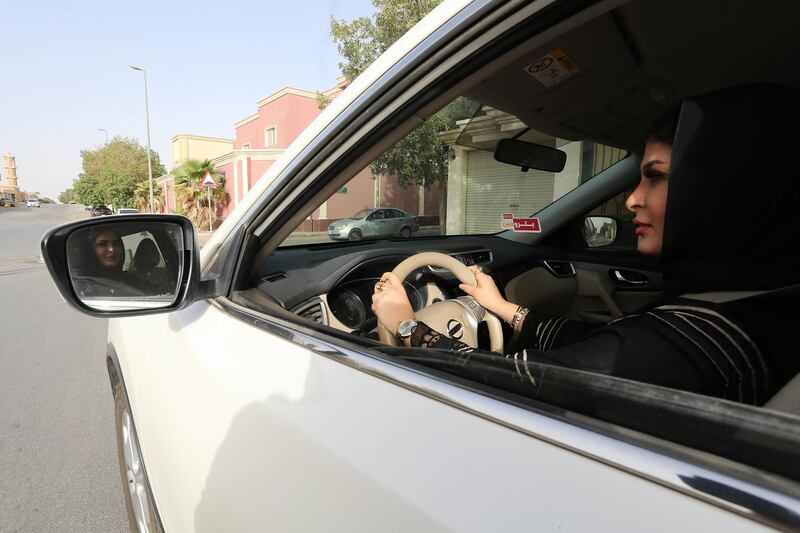It was a breakthrough for women and possibly the biggest sign of the change that is sweeping Saudi Arabia. The first week since the lifting of a ban on women driving brought smiles and happiness from those who benefited, as well as support from many families.
But it has also seen some women left to tackle old attitudes on the road.
With the government warning that harassment or threatening behaviour would be met by legal penalties, some men have used social media to poke fun at women drivers.
"Now that women can drive, I expect an increase in road accidents," said a Saudi Twitter user.
Such jibes have been met by a more polite response from leading female activists.
To Hatoon Kadi, a female comic and Saudi YouTube sensation, some men need to be more courteous towards female drivers.
"We are not asking you for much, I'm urging you to stay patient and ask you not to attack us or overtake us when we are waiting to take an exit at the roundabout," she wrote on Twitter.
More than 120,000 Saudi women have applied for driving licences, the Interior Ministry said last week, and six driving institutes for women have been established across the country.
Images and footage on social media showed Saudi police officers handing women motorists flowers, congratulating them and wishing them safe driving since the ban was lifted on June 24.
But for some in Jeddah, driving has proven a challenge as many complain that some men have not fully come to terms with the changes.
"The majority of drivers waive traffic guidelines, they get annoyed when you indicate and follow the rules. It's OK, even if some don't like it, it's uncomfortable," a female resident in the city, who asked to remain anonymous, told The National, urging men to be more open to the new regulations.
"Let's all start a new chapter, because both of us are learning, it's the first time they drive with women and the first time we are driving with men in our country," the mother of two added.
_______________
Read more:
[ Saudi Crown Prince Mohammed bin Salman's dynamic year of reform ]
[ Vogue puts Saudi princess in the driver's seat ]
[ First Saudi women given driving licences ahead of law change ]
_______________
Despite instances of sexism the driving reforms have been well received by young Saudis across the kingdom and no incidents of harassment were reported in the days since the ban was lifted.
"You'll always find negativity but I don't think they would have the guts to act on the streets, because if you do, we can complain and they will get a big fine," Hinda Al Rawaf, general manager at Qubygroup, a design company, told The National.
Mrs Al Rawaf, who now drives from Bahrain to the city of Khobar, believes that negative behaviour was to be expected, though she has seen many positive reactions so far on her journeys.
"When they do see me they either clap or give me a thumbs up. They are telling us to take care on the roads, although I’ve been driving for 20 years they are acting as if I got my licence yesterday," she said.
There will always be people that resist change, Rusha Al Rawaf, a resident in Khobar told The National.
"For the few men that have resisted the change that's exactly the reason as to why they are doing that, change is not easy to accept," she said.
In contrast, her 14-year old daughter almost cried from happiness when she went out for her first drive on Sunday.
The lifting of the ban on women drivers – part of Crown Prince Mohammed bin Salman's Vision 2030 to modernise the country – is expected to boost women's employment and add US$90 billion (Dh330bn) to economic output by 2030, according to a Bloomberg estimate.
The UN last week welcomed the lifting of the ban and said it hoped the move would generate new opportunities for women in the kingdom.
Prince Mohammed, appointed heir to the most powerful throne in the Middle East a year ago last month, has also lifted a ban on cinemas and mixed-gender concerts, following his vow to return the kingdom to moderate Islam.






